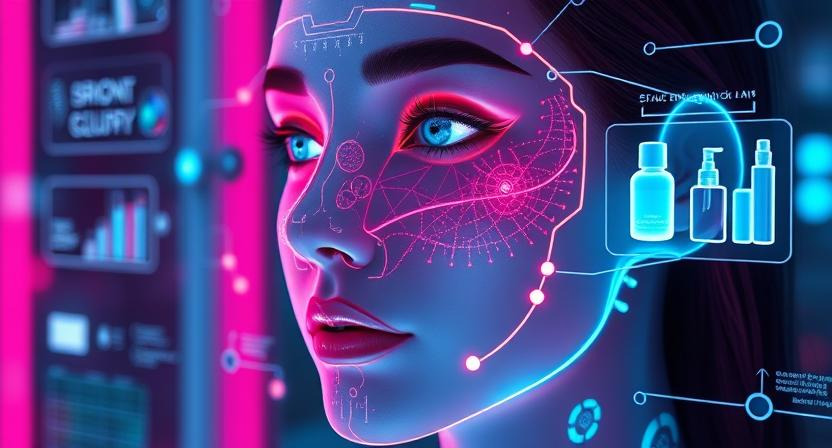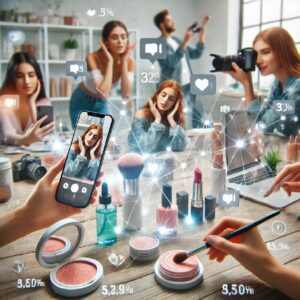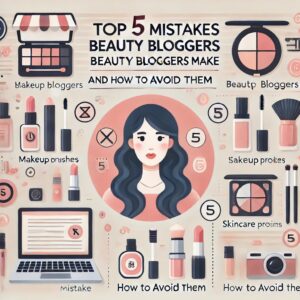Table of Contents
Introduction
The beauty industry is changing fast. Brands need to find new ways to connect with customers. One of the most effective strategies today is AI-powered personalized beauty marketing. AI helps companies create personalized experiences. This includes product suggestions, virtual try-ons, and skin analysis powered by AI. This article will show how businesses can use AI to transform their beauty marketing strategies.
1. The Role of AI in Beauty Marketing
Artificial intelligence is transforming the way brands interact with consumers. AI helps beauty companies understand what customers like. It also predicts trends and suggests products just for them. Through data-driven insights, AI enhances customer engagement and boosts sales.
How AI Enhances Beauty Marketing
- Data Collection & Analysis – AI gathers and processes customer data to understand their needs.
- Personalized Product Recommendations – AI recommends beauty products for you. It considers your skin type, age, and what you’ve bought before.
- Virtual Try-Ons: AR and AI let users try makeup and skincare products online.
- Chatbots & Virtual Assistants – AI-powered chatbots provide 24/7 beauty advice and recommendations.
2. AI-Driven Customer Segmentation
Customer segmentation is crucial for beauty marketing success. AI helps categorize customers based on their preferences, behaviors, and demographics.
How AI Segments Customers
- Demographic Analysis – AI identifies age, gender, and location to personalize marketing efforts.
- Behavioral Tracking – AI monitors customer interactions, such as browsing habits and purchase history.
- Predictive Analytics – AI forecasts future beauty trends based on past consumer behavior.
AI-driven segmentation helps brands make targeted marketing campaigns. This boosts engagement and conversion rates.
3. AI-Powered Product Recommendations
AI uses advanced algorithms to recommend beauty products tailored to individual customers. These personalized suggestions enhance the shopping experience and increase sales.
Examples of AI in Beauty Product Recommendations
- Skin Type Analysis – AI suggests skincare products based on a user’s skin condition.
- Makeup Preferences – AI uses past purchases to suggest the best shades and formulas.
- Fragrance Matching – AI helps customers find perfumes based on their scent preferences.
By integrating AI-powered recommendations, beauty brands can enhance customer satisfaction and loyalty.
4. Virtual Try-Ons and Augmented Reality (AR)
A thrilling use of AI in beauty marketing is virtual try-on technology. AR beauty apps let customers try makeup, hair colors, and skincare products live.
Benefits of Virtual Try-Ons
- Increases Confidence in Purchases – Customers can see how a product looks before buying.
- Reduces Returns – Virtual testing minimizes mismatched purchases.
- Enhances Engagement – Interactive experiences keep customers engaged longer.
Sephora, L’Oréal, and MAC use AI for virtual try-ons. This boosts the online shopping experience.
5. AI for Personalized Skincare Solutions
AI-powered skincare tools analyze users’ skin conditions and provide personalized recommendations.
How AI Improves Skincare Marketing
- AI Skin Analysis – AI scans the skin to detect issues like acne, wrinkles, and hydration levels.
- Custom Skincare Formulations – AI creates personalized skincare routines based on user data.
- Real-Time Skin Monitoring – AI tracks skin changes over time and adjusts recommendations accordingly.
This technology helps beauty brands provide unique solutions based on customer data.
6. AI-Powered Chatbots for Beauty Assistance
AI chatbots enhance customer service by providing instant beauty advice and product suggestions.
Key Features of AI Beauty Chatbots
- 24/7 Customer Support – Chatbots answer questions and provide recommendations anytime.
- Personalized Beauty Advice – AI-driven chatbots analyze skin types and beauty preferences.
- Product Education – Chatbots inform customers about product benefits and usage.
Brands that use AI chatbots can enhance customer experience. They also cut down response times and boost conversions.
7. Social Media AI for Beauty Marketing
Social media is key in beauty marketing. AI helps brands improve their strategies.
How AI Enhances Social Media Marketing
- Content Personalization – AI curates beauty content based on user preferences.
- Influencer Matching – AI identifies the best beauty influencers for collaborations.
- Automated Engagement – AI responds to comments and messages in real-time.
AI social media tools boost beauty brands’ engagement and strengthen customer ties.
8. AI in Beauty Subscription Boxes
AI enhances beauty subscription services by tailoring products to individual preferences.
How AI Improves Beauty Subscription Boxes
- Personalized Product Selection – AI chooses products based on customer history and feedback.
- Dynamic Customization – AI adjusts box contents based on seasonal needs and trends.
- Customer Retention – AI-driven recommendations increase satisfaction and reduce cancellations.
Beauty subscription brands, like Birchbox and Ipsy, use AI. This technology helps them offer a personalized experience for their customers.
9. AI-Generated Beauty Content
AI assists in content creation for blogs, videos, and social media posts.
AI in Beauty Content Marketing
- Automated Blog Writing – AI generates informative beauty articles.
- AI-Edited Videos – AI enhances beauty tutorials and product reviews.
- Personalized Email Campaigns – AI curates emails based on user interests.
AI-powered content marketing ensures consistent, engaging, and relevant beauty content for customers.
10. AI for Market Trend Analysis
AI helps beauty brands keep up with trends. It does this by analyzing consumer data and industry patterns.
How AI Predicts Beauty Trends
- Social Listening – AI monitors conversations about beauty trends on social media.
- Data Analytics – AI identifies emerging beauty preferences based on sales and search data.
- Competitor Analysis – AI tracks competitors’ strategies to improve marketing efforts.
By leveraging AI-driven insights, beauty brands can develop trend-based products and marketing campaigns.
11. AI for Sustainable Beauty Marketing
AI helps the beauty industry be more sustainable. It cuts down waste and supports ethical practices.
Sustainable AI Applications
- Eco-Friendly Product Recommendations – AI suggests sustainable beauty products.
- Smart Inventory Management – AI predicts demand to cut overproduction.
- AI-Powered Recycling Programs – AI assists in product recycling initiatives.
Sustainable AI-driven strategies help beauty brands align with eco-conscious consumers.
12. Ethical Considerations in AI Beauty Marketing
While AI enhances beauty marketing, ethical considerations must be addressed.
Key Ethical Concerns
- Data Privacy – Brands must ensure customer data is secure and used responsibly.
- Bias in AI Algorithms – AI models should be trained to be inclusive and diverse.
- Transparency – Brands should disclose AI’s role in product recommendations.
Maintaining ethical AI practices builds customer trust and credibility.
Conclusion
AI is transforming beauty marketing by enabling highly personalized and engaging customer experiences. Beauty brands can use AI to boost customer satisfaction and sales. AI skincare solutions, virtual try-ons, and smart chatbots keep them ahead of trends. AI is evolving fast. Its impact on the beauty industry is increasing. Brands need to use AI to innovate and succeed.
Frequently Asked Questions (FAQs)
1. How does AI improve beauty marketing?
AI boosts beauty marketing with:
- Personalized product recommendations
- Virtual try-ons
- Customer segmentation
- AI-powered chatbots
2. What are AI-powered virtual try-ons?
AI-powered virtual try-ons use augmented reality (AR). This lets customers test makeup and skincare products digitally before they buy.
3. How do AI chatbots help beauty brands?
AI chatbots give quick beauty tips, respond to customer questions, and suggest products based on what users like.
4. Can AI predict beauty trends?
Yes, AI looks at consumer behavior and social media data. It helps predict future beauty trends and what people will like.
5. Is AI in beauty marketing ethical?
AI should be used responsibly. This means protecting data privacy, avoiding bias in algorithms, and being transparent. These steps help maintain ethical standards.




